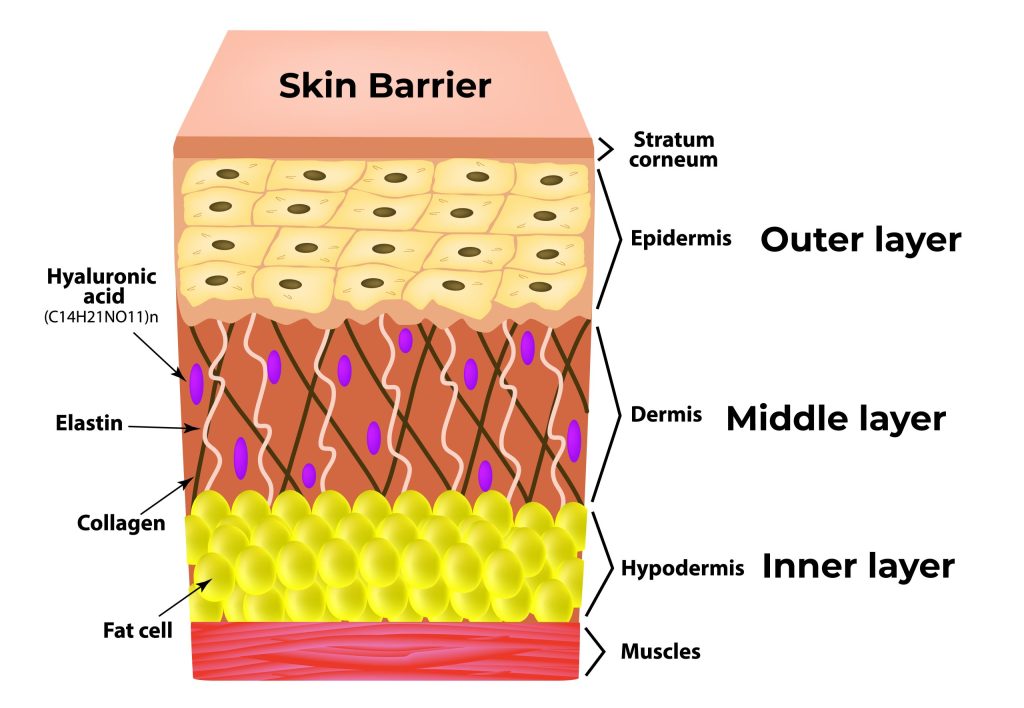
Disclaimer: This post contains affiliate links
Your skin’s happiness starts with a healthy barrier. If you’ve ever dealt with dryness, irritation, or stubborn breakouts, your skin might be begging for some TLC. Enter the world of skin barrier repair—your shortcut to a glowing complexion.
Keep reading, and we’ll demystify the magic behind a strong skin barrier and introduce you to the top products that can transform your skincare routine. Say goodbye to redness and sensitivity, and hello to radiant, resilient skin!
What is the skin barrier?

What exactly is this “skin barrier” we keep talking about? The skin moisture barrier, also known as the acid mantle, is a thin, protective layer on the surface of your skin, primarily located in the stratum corneum, which is the outermost layer of the epidermis. This natural protective barrier is made up of a combination of sebum (an oily substance produced by the sebaceous glands) and sweat, which creates a slightly acidic film on your skin’s surface. The pH of the acid mantle typically ranges between 4.5 and 5.5, making it mildly acidic.
Think of it as your skin’s invisible armor—its defense against the outside world. This natural barrier is like a protective shield, composed of lipids, proteins, and skin cells that work together to keep moisture in and harmful elements out. It’s the gatekeeper that ensures your skin stays hydrated while also safeguarding it from environmental stressors like UV rays, pollution, and bacteria. In simpler terms, it’s your skin’s best friend, ensuring that it looks and feels its absolute best.
Signs of a damaged skin barrier
A compromised moisture barrier, also known as a compromised skin barrier or impaired skin barrier, can exhibit various signs and symptoms. If you suspect that your skin’s moisture barrier is compromised, look out for the following common signs:
- Dryness and Dehydration: One of the most obvious signs is dry and dehydrated skin. Your skin may feel tight, rough, or flaky
- Redness: Increased redness or persistent flushing of the skin can be a sign of barrier damage. This can be especially noticeable in people with sensitive skin.
- Sensitivity: Heightened sensitivity to skincare products, environmental factors, or even water can indicate a compromised barrier. You may experience stinging or burning sensations.
- Itchiness: An itchy sensation, sometimes described as “skin itch,” is a common symptom of a damaged barrier.
- Inflammation: Barrier damage can lead to inflammation, which may manifest as red, irritated patches on the skin.
- Increased Sensitivity to Irritants: You might notice that your skin reacts more strongly to skincare products or environmental irritants that didn’t bother it before.
- Breakouts: Surprisingly, a damaged barrier can lead to an increase in breakouts, as it can’t effectively keep out acne-causing bacteria and pollutants.
- Rough Texture: Your skin’s texture may become uneven and rough, rather than smooth.
- Visible Fine Lines and Wrinkles: A compromised moisture barrier can exacerbate the appearance of fine lines and wrinkles.
- Flare-ups of Skin Conditions: If you have preexisting skin conditions like eczema or psoriasis, a compromised barrier can lead to more frequent flare-ups.
- Excessive Oiliness: Paradoxically, some individuals may experience an increase in oiliness as the skin tries to compensate for the loss of moisture.
Causes of a damaged skin barrier
A damaged moisture barrier can result from a variety of factors and lifestyle choices. Identifying and addressing the underlying causes are essential for effective barrier repair. Here are some common causes of a compromised moisture barrier:
- Over-cleansing: Excessive or harsh cleansing, especially with products containing sulfates or alcohol, can strip the skin of its natural oils, leading to a weakened barrier.
- Exfoliation: Overuse of physical or chemical exfoliants, such as scrubs, peels, or strong acids, can irritate and damage the skin’s surface.
- Hot Water: Frequent exposure to hot water, such as long hot showers or baths, can strip the skin of its natural oils and disrupt the barrier.
- Harsh Weather Conditions: Extreme temperatures, low humidity, and harsh weather conditions (e.g., cold winds, dry air) can contribute to barrier damage.
- Age: As we age, our skin’s ability to retain moisture and repair itself naturally diminishes, making it more susceptible to damage.
- Overuse of Drying Skincare Products: Products that contain alcohol, benzoyl peroxide, retinoids, or other drying ingredients can contribute to barrier damage if used excessively.
- Inadequate Moisture Failing to use a suitable moisturizer or using one that doesn’t match your skin type can lead to moisture loss and barrier impairment.
- Skin Conditions: Certain skin conditions, such as eczema, psoriasis, or rosacea, can compromise the moisture barrier as part of their symptomatology.
- Environmental Factors: Pollution, UV radiation, and free radicals in the environment can damage the skin barrier over time.
- Unhealthy Diet: Poor nutrition, including inadequate hydration and essential fatty acids, can impact skin health and barrier function.
- Stress: Chronic stress can trigger hormonal changes that affect the skin’s ability to repair and maintain its barrier.
- Medications: Some medications, like oral isotretinoin (commonly used for acne treatment), can lead to dryness and compromise the skin barrier as a side effect.
- Genetics: Some individuals may be genetically predisposed to having a weaker skin barrier.
How to repair your damaged skin barrier
Repairing a damaged moisture barrier is a process that involves restoring the skin’s natural protective functions and maintaining hydration. Here’s a step-by-step guide on how to repair a compromised moisture barrier:
- Discontinue the use of harsh products: Take all your favorite exfoliants and products with active ingredients (retinol, glycolic acid, mandelic acid, vitamin C, lactic acid, beta-hydroxy acid, etc.) and set them aside for 6–8 weeks.
- Switch to a gentle skincare routine: Replace your current skincare routine with gentle, restorative products.
- Don’t forget to add hydration: Add serums and moisturizers to your routine rich in hyaluronic acid, glycerin, aloe, and other hydrating ingredients.
- Use products with barrier-repairing ingredients: Include products in your routine that contain lipids, ceramides, niacinamide, hyaluronic acid, allantoin, panthenol, and omega fatty acids.
- Don’t forget the SPF: Skipping SPF will only make a bad situation worse. Use a broad-spectrum SPF with a rating of 30+ or more.

